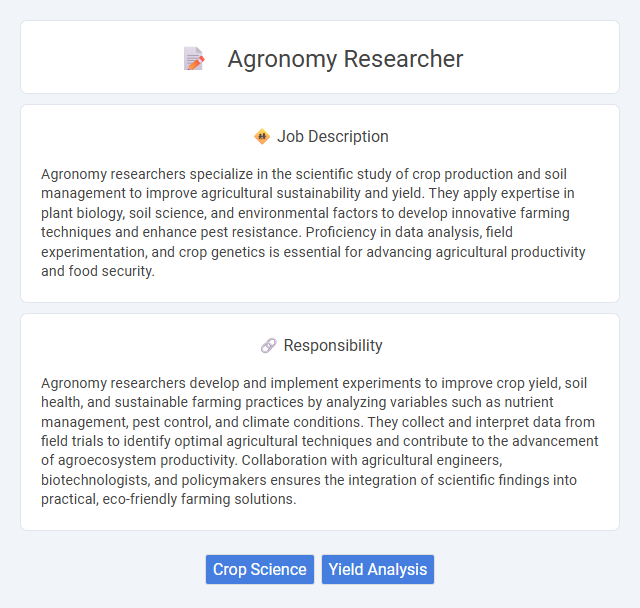
Agronomy researchers specialize in the scientific study of crop production and soil management to improve agricultural sustainability and yield. They apply expertise in plant biology, soil science, and environmental factors to develop innovative farming techniques and enhance pest resistance. Proficiency in data analysis, field experimentation, and crop genetics is essential for advancing agricultural productivity and food security.
Individuals with a strong interest in plant science, analytical skills, and patience are likely to be well-suited for an Agronomy Researcher position. Those who thrive in both laboratory and field environments, and demonstrate persistence in conducting experiments and data analysis, may find this role rewarding. Candidates lacking a passion for detailed scientific work or adaptability to varying outdoor conditions might face challenges in this career.
Qualification
An Agronomy Researcher must possess a strong background in agricultural sciences, typically holding a master's or doctoral degree in agronomy, plant science, or related fields. Proficiency in data analysis, experimental design, and knowledge of crop genetics, soil fertility, and sustainable farming practices are essential. Experience with field trials, laboratory techniques, and agricultural technology enhances the researcher's ability to develop innovative solutions for crop improvement and resource management.
Responsibility
Agronomy researchers develop and implement experiments to improve crop yield, soil health, and sustainable farming practices by analyzing variables such as nutrient management, pest control, and climate conditions. They collect and interpret data from field trials to identify optimal agricultural techniques and contribute to the advancement of agroecosystem productivity. Collaboration with agricultural engineers, biotechnologists, and policymakers ensures the integration of scientific findings into practical, eco-friendly farming solutions.
Benefit
Agronomy researchers likely enjoy numerous benefits, including opportunities to contribute to sustainable agricultural practices and advancements in crop production. The role probably offers access to cutting-edge technology and collaboration with industry experts, enhancing professional growth. Furthermore, competitive salaries and potential funding for innovative projects may provide financial stability and career satisfaction.
Challenge
Agronomy researchers probably face the challenge of addressing unpredictable climate patterns that affect crop productivity and soil health. They might encounter difficulties in developing sustainable farming practices that balance environmental concerns with food demand. Overcoming these obstacles requires innovative experimentation and data analysis to improve agricultural resilience.
Career Advancement
An Agronomy Researcher advances their career by gaining expertise in crop science, soil management, and sustainable agriculture, often pursuing advanced degrees such as a Master's or PhD. Publishing research findings in scientific journals and securing grants strengthens their professional profile, opening opportunities in academia, government agencies, or agribusiness firms. Leadership roles in project management and collaboration with multidisciplinary teams further enhance career growth and industry impact.
Key Terms
Crop Science
Agronomy researchers specializing in crop science analyze plant genetics, soil health, and climate factors to improve crop yield and resistance. They employ precision agriculture technologies and data analytics to optimize planting strategies and nutrient management. Their work directly supports sustainable farming practices and food security advancements.
Yield Analysis
Agronomy researchers specializing in yield analysis utilize advanced statistical methods and field trial data to optimize crop productivity and sustainability. They evaluate factors such as soil health, irrigation techniques, and genetic crop variations to identify practices that maximize yield efficiency. Their work supports decision-making in agricultural management and policy development to enhance food security.
 kuljobs.com
kuljobs.com